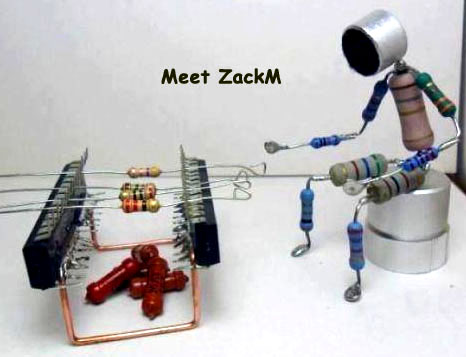|
"Greatness
is not measured by what a man or woman accomplishes,
but by the challenges he or she must overcome to reach it."

The
difficult aspect of theremin design is a Voice that is
musical. That is why many developers are reluctant to post sound. Everything else falls into second place. By nature no two
analog theremins should sound exactly alike. I consider digital
outside of Nature starting with the square wave. I do use one 555 but
for a tuning tool which turns on an LED. This aids in proper audio level
setting and eliminates the need
for an oscilloscope to tune the RF section. The beautiful
voice is a dance between all the circuits, RF to the Audio
output. Use one board of my theremin for a crisp distortion-less $65 stand alone proximity volume control or use the
TRS
output (stereo) jack for a fluid proximity expression pedal
minus the pedal. Volume-Expression .mp3 100kb
The TRS jack is electrically isolated using an optical variable
resistor.
The
RS Theremin "illusion"
is the full package DIY theremin for $125 with the authentic Voice
that has virtual emotion,
Perfect Pitch Field Linearity and excellent Volume Response
& Shading. Thermal drift at 300 hz is less than one
musical note over 10 degrees F room temperature change. The
illusion is designed to use two identical 3"x 8.2"
pcb's (pitch/volume) which makes it ideal to fit into Lev
Sergeyevich's horseshoe U shaped cabinet. Unfortunate is the
fact the EtherWave Pro will loose it's
appeal once this original illusion analog theremin design is
popularized. Listen to the differences in my theremin voice
which is feature #1 compared to the Epro "whistle" without
effects added if you can find a raw sample. You would
come out ahead if you paid someone $1000 labor to build the
"illusion" for you.
These
sound samples are good yet you can shape it
into your own personal sound, it gets even better.
Along
my theremin journey I found three methods of getting a
more authentic theremin sound instead of a dry whistle. (One
was Armstrong Oscillators) I
now know of two methods to get perfect
pitch field linearity, one with the Lev Antenna (sine wave)
and the other using an 18" wire antenna. The latter is a
perfect triangular (not saw-tooth) breathy flute audio waveform from analog
heterodyne standard oscillator circuits. Both
methods "do not" use any inline inductors or
capacitors. I believe there is a misunderstanding of
what exactly is going on in this linearity area. Theremins seem counter
intuitive and engineers spend most of their time trying to
correct the problems "they" create for themselves. I
had rules found in my Vision at the
beginning of my journey as I am not an engineer and have never
worked in electronics. Rules:
Lev's Antenna was for everyone, I would
not look at how anyone
else builds a theremin, I would not visit LEVNET and I
would not SELL anything. In turn I received the gift of
gold which would be
Clara's Voice, an idea, a treasure I did not recognize in the
beginning. A
good theremin voice is no accident, get an audio sample before you
buy or build anything. If no sample is available the design is
flawed no matter how old, pretty it is, what it costs, who designed
it or who built it. The
illusion was built through evolution... without the use of
modeling, schematics or
internet help,
I just listened, that is the illusion...
|